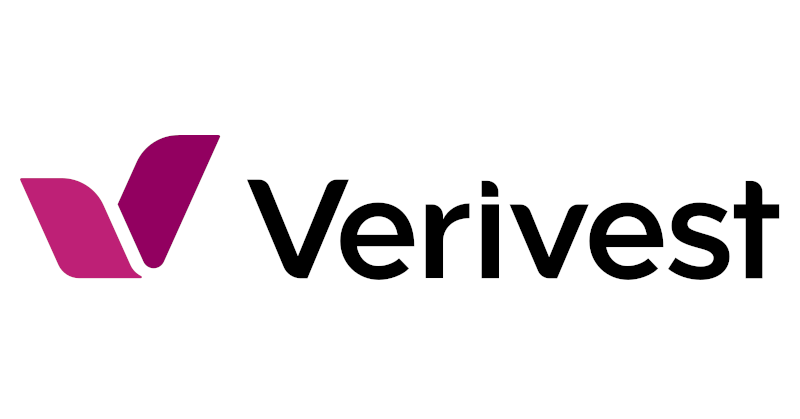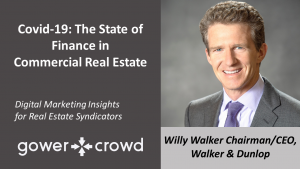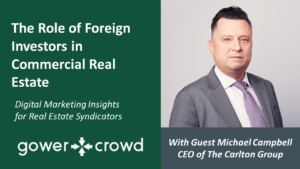427 Lance Pederson - Founder of Verivest
Cracking the real estate crowdfunding code
 Lance Pederson, Managing Direct, Verivest
Lance Pederson, Managing Direct, Verivest
As the real estate crowdfunding world exponentially grows ever bigger my guest, Lance Pederson managing director at Verivest, has identified a need investors have and has filled it with a powerful solution you are going to hear about in today’s episode.
Lance has identified that the number one more important component of making an investment is TRUST, specifically trust in the sponsor – the person you are sending your money to as an investor. How do you know that what they are telling you is true? What about ongoing performance once a company has taken your money to invest in a deal. How do investors rest assured once their wires have gone through to a sponsor that all is moving along as planned. Lance explains all today as you will hear.
What You're Going to Learn
- Using Established Services to Expedite your Capital Raise
- Giving confidence to real estate investors through deal monitoring
- A mission to protect Real Estate Investors from Fraud
- Shortening the Sales Cycle in Crowdfunding
- Stop the Hard Sell in Real Estate because Buying
behavior has changed - Building a more robust set of fundraising tools
Related article: The Ultimate Guide to Crowdfunding Real Estate Development
Listen To or Watch the Full Podcast Here
Show Highlights
FOR REAL ESTATE DEVELOPERS
THE WHITE BOARD WORKSHOP
Learn the exact system best of class sponsors use to raise money online.
Using Established Services to Expedite your Capital Raise
Adam Gower: Somebody who is listening that really doesn't know what you guys do and how you can - I'm going to quote back at you - how you can help them hit the ground running to do their fund raise. How do you do that? What are you offering to sponsors?
Lance Pederson: Yeah, I mean, I think that, I mean the first thing we sort of offer. No, matter how, if you're just getting started, you're going, I think it's just sort of that consultation around. Ok, great. You found a deal and you need $3 million bucks in equity capital and you've listened to Adam tell you that you should syndicate this and you've read his book, you know, "Syndicate" and you've read Unleashed and you're like, I want to do this, right? So...
Adam Gower: Thanks for the plug.
Lance Pederson: You know, but I mean, it's true right? I mean, that's basically everything you sort of talk about it. It's like, it's the same thing. So for us, you know, you come to us, we're going to help you get those legal docs put together. So you've got a PPM and you've got an operating agreement and you've got your subscription booklet. You know, those are the things that investors are going to have to read and sign in order to invest.
We've got an investor portal so that you can put that up - where you can upload those offering materials and then it's really, you know, driving, you know. Whether you're raising it, sort of, from people you don't know or it's your friends and family, you still need to get the word out, right? So you need to send communications to those investors letting them know that there's an opportunity and you need to drive them someplace so that they can indicate interest, right? Like, Hey, I'm in - 50 grand. And if you've done a really good job, you might fill up that whole $3 million in no time flat. So you need to, sort of, manage. Ok, great. I need - certain people just can't get in, you know, maybe next time you can get in.
So our system sort of handles all of those things. So that's what we do. Is this combination of the software really, and the people. In this case, I mean, like accountants and bookkeepers and we've got tax people and investor relations and compliance people that handle a lot of those things that, you know, really don't necessarily have anything to do specifically with sort of real estate or asset management.
But you certainly, as you know, to keep yourself out of trouble, you know, you need to make sure that you're sort of complying with all the regulations in those things. So, that's really what we do at Verivest is a little bit more - help on all those fronts and guide you through that process. That's what we do.
Giving confidence to real estate investors through deal monitoring
Adam Gower: The typical model for crowdfunding platforms that provide similar services will put up. Will get a page, you can pitch your deal. Will get it out there in front of investors. Will help you with documentation. I don't know to what extent, et cetera, et cetera. I'm thinking of, you know, the kind of the big ones RealCrowd, CrowdStreet, RealtyMogul and some others - Equity Multiple, of course.
Lance Pederson: Yeah.
Adam Gower: But, what they do. Their value proposition to investors is: we've underwritten the deal and the sponsor and we like it. So, we've allowed it on our platform with a huge raft of CYAs. Don't trust anything we tell you underneath, but basically value prop is, we've underwritten these deals.
Lance Pederson: Yeah.
Adam Gower: Yours is different, isn't it? You're really your extra layer is come look at these deals, but. Ah, and we've really done a deep dove on this sponsor, so you can trust the sponsor. Make your own decision on the deal. Is that basically the angle you're taking?
Lance Pederson: Yeah, I mean, to clarify a bit further, is that, like you said. The other platforms that you mentioned are vetting the deal and they're passing judgment. We believe this is a good deal. Yes or no.? If yes, then you can list if no, you can't. What we've done, it's a bit different, is that. We don't pass judgment on the deal, but what we require people who do list offerings that are accessible on our platform to the public is that we require them to engage us to monitor that deal on an ongoing basis because my belief is that, you know, there's risk involved in investing in these real estate deals.
That's why you're able to generate double digit returns. And what that means is that the deal - they may be unable to execute the business plan and they might not obtain the results that they were hoping for. But for me, I think the bigger risk oftentimes is that if the deal does go sideways, it's the things that - the decisions that many people make, that make it worse. Like pulling and sucking money out of the deal, you know, those sorts of things. So for me, I just believe that if we can sort of - if we're looking where all the money's going and ensuring that all the fees are being calculated correctly and that they're reporting on a quarterly basis, you know, we're basically forcing them to face the music should this deal, you know, not perform or begin to not perform right.
They've got some additional accountability, whereas in the absence of us, just using one of the other platforms as an example, they could raise all the money for the deal and then after the deal's done, the sponsor, if it starts to go sideways or be completely dark, and the platform is just saying, not our problem. Whereas for us, we're more of like, hey, they listed it there, we're going to force them to do the right thing.
It's not to say they won't stick their head in the sand and and not do the right thing, but they're going to be doing that publicly. It's going to be a bit harder to sort of get away with it. So for me, it's like, what happens post investment is just sort of the thing that's been overlooked, in my opinion, because that's where a lot of - when you look at deals that have failed, that's usually when all the bad...
Adam Gower: Exactly, that's right. Yeah.
A mission to protect Real Estate Investors from Fraud
Adam Gower: That's a very cool box to check, that you do is that trust box because you never know. I mean, you know, I get all these SEC news alerts and you know, people are committing fraud left and right. Extraordinary. I'm sorry, I signed up. It's kind of a grim email. Somebody else just got nailed for fraud, which means there's a lot of poor people out there that got nailed. But, that's what you eliminate, right? You do enough due diligence that you know they're not crooks.
Lance Pederson: That's, you know, Adam. That's my passion, right? So, you know, all the stuff we've talked about, I mean, you said it, aside for me, the mission and all the people that work at our company, it's to protect investors. So for me, it's what it's all about is that I just - it makes me sick that people are being swindled. When we can - this is what we can do to sort of help avoid that. There's plenty of good guys out there who do the right thing when no one's looking, even when we're looking over their shoulder. There's no reason to fall for some of these crazy schemes that people run. Adam, it's unfortunate, right? It's just sort of humanity..
Adam Gower: You know, but..
Lance Pederson: It's a slippery slope. They sort of - they woke up many days and they were good guys until one day they weren't and then they started doing the wrong thing. And I think that's what we protect against.
Shortening the Sales Cycle in Crowdfunding
Lance Pederson: The sales cycle from the time you meet somebody to them investing - the amount they invest goes up, the chances that they tell their friends go up. It's all of those sales funnel metrics. That's numbers that need to move. Now the trouble is, when you're selling what we do to sponsors is that they've never been - they've never really thought of their fund raise as a sales - like, the marketing funnel as a sales cycle. So they're going: I don't even know what the numbers are. I just know that, every time I talk to some guy, they usually won't invest for like 12 months or 18 months. And I'm going, well, you know - and we're starting to get - we've got anecdotal evidence and we're starting to get empirical evidence that that - I call it, shortcut the time to trust. And I just believe that, if you're on the Verivest, in the Verivest sponsor network, those are the things that happen. And you know, it's a beautiful thing, more efficient. You spend your time doing what you like doing.
Adam Gower: Lance, you and I are so living in the same world. That's exactly - that's the issue for sponsors. You know, we build these systems, as you know, and our clients, you know, before they come in, I always try to explain this to them clearly up front. But, some folk, you know, they'll come in and just expect to switch on the machine and money to start kind of pouring in through the ceiling. Run around with a hat, collecting it. No. You still got to work, but, you used the term, that sales cycle is shortened. You still got to do work, but when you meet somebody for the first time, they are already way advanced in that sales cycle. The first question isn't, who are you? Where are you from?
Lance Pederson: Yeah.
Adam Gower: The first question might be, you know, can I send you paper documents or can I use my IRA to invest? Well, it's like completely different qualitatively.
Stop the Hard Sell in Real Estate because Buying behavior has changed
Adam Gower: People don't want to sit in two hour pitch meetings. They don't want to do that. They want to learn entirely independently online. Who you are, what you're doing. They want to do it at their own time time, on their own devices, in their own way. And then they'll come to you. But this idea that they want to remain anonymous. I never framed it quite that way. But that's exactly what it is, isn't it?
Lance Pederson: Exactly what it is. And I think that that's - that's why guys like you and I, we get so excited about this industry because we see the shift. We see the change. Let's face it, we say it out loud now - it's obvious. Because, every other industry has sort of gone through a similar transformation, right? But that's here now and so I don't want to hear it. That's what I mean. I get sort of - I cringe a bit with the crowdfunding stuff, whatever I'm like, you're missing the boat. Like, I get it. We can call it that if we want to. But it's just realizing that buying behavior is changing and people's expectations and their savviness is increasing. So they want to be able to and expect they should be able to go and get a bunch of information ahead of time without you knowing. And then they'll go ahead. And if you're worthy and you meet their criteria, you know, you'll hear about it, right? But, to think that you're going to pull them in, like you said in two hour pitch meetings and all that sort of stuff.
Adam Gower: Yeah.
Lance Pederson: It's not
Adam Gower: Sponsors that want to do that either, though, Lance. Nobody wants to. I mean, I spent my entire career booking appointments to pitch people and half of my life in meetings, you know, trying to nurture people through the - in-person - nurture them through the process. It's brain down. It's just - there's no reason to be doing it like that anymore.
Building a more robust set of fundraising tools
Adam Gower: So, Verivest. Where - and I was going to say, where do you see Verivest in five years, but, that's a very long time from now, right? Where do you - so, I'm going to rephrase the question. Where do you see Verivest in the future? Where are you headed? Where do you want to get? Where is its maturity?
Lance Pederson: Yeah, I mean, I think for us, the maturity is that, you know, it's real estate only, right? It's going to be - it's commercial real estate, it's sub institutional, right? We're not. We're not, we're never. It's all about this high net worth, you know, family office type of capital with sponsors who've embraced what we've just talked about, right? And so that's really the future. What that looks like, right, is that you basically come into the Verivest website and you push some buttons to basically get everything you need done.
That's why I call it the operating system. It's just - if you're a deal sponsor, it's just all done through the application. And, that's really where we're at. That's really what we're doing. In fact, you know, some of the stuff, the feedback, we talk with you and other guys like you, it's just building a more robust, set of fundraising tools. So just that whole process - giving people more powerful tools so that they can put it in the hands and engage people like yourself to help them do the digital marketing stuff, right?
So we just see it as the - you come to Verivest with 10 investors. You're going to try to get to where it's 50, 100, 150, 200 plus investors. You keep adding that base, doing bigger deals and it's turnkey. One vendor.
Related to this episode:
A guide for remote workers
How to Setup a TV Studio Quality Home Office















